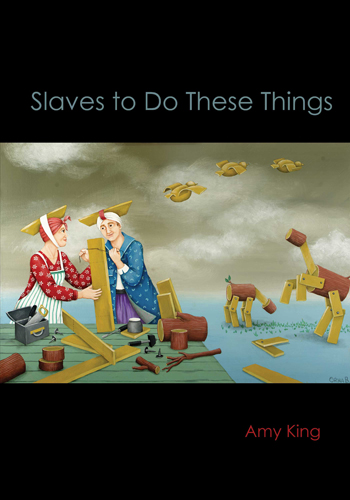Issue 2 - Winter 2010 Reviews Anxious Music Blood Dazzler Cities of Flesh and the Dead Crazy Love Cures and Poisons Dark Card and Mom's Canoe Fire Pond How to Live on Bread and Music Mister Skylight Paternity Perpetual Care Pictures in the Firestorm Rhapsody of the Naked Immigrants Rock Vein Sky Six Lips Slaves to Do These Things Slide Shows The Air around the Butterfly The Guilt Gene the nested object Interviews
 |
Slaves to Do These Things is Amy King's fourth book of poetry. In this work, King creates a dialog between enslavement and freedom. Her voice usually presents in the conversational New York style that we see in the work of writers as diverse as Kenneth Koch and Enid Dame. Yet often her stories and images turn the reader in unexpected directions. In "My Brain is it's Own Head," she writes
In these lines, King combines a relaxed tone, with surprising dialog and imagery. She insists the reader/other hear and feel what is essential, as a counterweight to the surface of conversation. The staging of this book is brought to the forefront by King's division of it into five acts, like a classic drama. In the first Act, King begins with one of the many poems in this book that refer directly to religious imagery, "The Psalms Called 'Breath.'" A later poem in this section "The Memory Skin," explicitly confronts complicity. King writes "I am opposite marriage./ My dinner cake is made/ guerrilla style...." In these lines, a large idea, marriage, is domesticated into cake, and then moved into the terrain of war. As a lesbian, King finds herself on the opposite side of that discussion. The second act begins with a quote from Betty Smith's, A Tree Grows in Brooklyn, "Growing up spoiled a lot of things." This section of the book contains poems about childhood and adolescence.
In this poem King contrasts the wildness of the child with that of the adolescent. Act III confronts many forms of betrayal. Original sin is reassigned to God in the poem "Hymn For the Misbegotten."
Poems such as "Doctor Starch," and "The Taste of Light & Our Digestive Tracks," discourse on the betrayal of the body. The last two Acts move towards a resolution of sorts. In Act IV, the motion slows down, literally in the poem, "Radio Sleep," where a series of fragments ricochet the way dream and story mix when we listen to the radio while dozing off. Act V, begins with a line from Virgil's Aeneid, "They Can Because They Think They Can." This section moves toward resolving the questions of slavery and freedom that King's book brings to the forefront. The poem "The Nature of Nature" seeks to contextualize the poet and her work, while protecting her from the automatically critical stance she fears, "...please don't mock/ my noise, my rustle,/ the scripts of my plot,/ these chrysanthemums..." The poem equates "content" with fruit: "...as we fruit that content/ with gravity's puppets/ an apothesis of gratitude..." It concludes with a God who is part of nature, and who provides a context for poetry.
Amy King's Slaves to Do These Things, is a brave book. King is not afraid to confront central questions like how we internalize oppression, and she is not afraid to use the word God in her poetry. There are times when I wish the book included more formal variety -- some poems with longer lines, or prose poems, or regular stanzas. It seemed too much like the free-verse counterpart to a recent book by a male New York poet where every poem was written in 14 to 20 iambic lines. In both cases, individually many of the poems have much to recommend them, but in book form, the reader wants more variety. In spite of these quibbles, Slaves to Do These Things, rewards our time with both images and ideas that will remain after we put the book (temporarily) on the shelf. Reviewed by Carol Dorf. |
